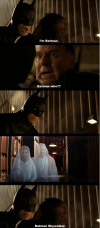- Joined
- Nov 2, 2019
- Messages
- 1,453
- Reaction score
- 4,261
What do you prefer playing, good guys or bad guys? I've always been a fan of revisionist stories so will usually default to bad guys or, at the very least, anti heroes. But I know some people will only ever play Dudley DoRights.
So what's your camp? And if you're like me, where do you draw the line? Murder? Arson? Slavery? Rape?
(For the record, I'm not advocating actual crimes but I figure fictional crimes against imaginary people - whilst being unpleasant - are a matter to be resolved between consenting adults).
So what's your camp? And if you're like me, where do you draw the line? Murder? Arson? Slavery? Rape?
(For the record, I'm not advocating actual crimes but I figure fictional crimes against imaginary people - whilst being unpleasant - are a matter to be resolved between consenting adults).





 ?
? ).
).
 !
! .
. I find exploring that which I did not anticipate pushes me out of my comfort zone, and I enjoy the unexpected results. It also becomes gaming fodder for how to enliven future NPCs when I GM.
I find exploring that which I did not anticipate pushes me out of my comfort zone, and I enjoy the unexpected results. It also becomes gaming fodder for how to enliven future NPCs when I GM. (I guess that makes my hat paisley.
(I guess that makes my hat paisley.  )
)
